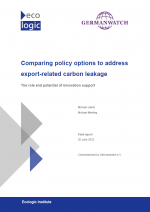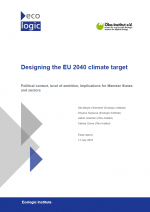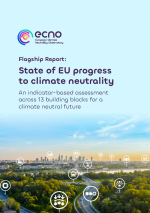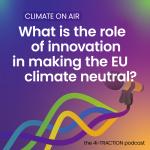Ecologic Institute Newsletter No 250 – July 2023
- Ecologic Institute Newsletter
Comparing Policy Options to Address Export-related Carbon Leakage – Report
From 2026, the European CO₂ border adjustment (CBAM) will ensure that European industrial companies remain competitive despite rising CO₂ prices. However, the CBAM only covers imports into the EU: The question of whether and how the EU should take action to ensure the competitiveness of exporting companies is still unresolved. This study analyzes different approaches to ensure the competitiveness of export-oriented companies. The authors recommend targeted innovation promotion as a particularly beneficial policy instrument.
Designing the EU 2040 Climate Target – Report
In the coming years, the EU has to adopt a legally binding climate target for 2040. The European Climate Law obliges the EU to adopt such a target. The European Scientific Advisory Body on Climate Change (ESABCC) recommends a 2040 EU climate target of minus 90–95% and an EU emission budget of 11–14 Gt for the period of 2030 to 2050. A new report by Ecologic Institute and the Oeko-Institut discusses the level of ambition of a 2040 EU climate target. The report analyzes the implications of a 2040 climate target for Member States and sectors.
State of EU Progress to Climate Neutrality – Report
The EU Climate Law legally binds EU countries as a whole to become climate neutral by 2050. Achieving this goal requires transforming the way we produce, consume, travel and eat. EU institutions have already put in place many measures to guide and support governments, businesses and citizens in this transition. To be effective, policymakers must now understand how – and at what pace – these measures translate into changes in the real world. The European Climate Neutrality Observatory's (ECNO) flagship report is the first ever assessment to provide this information at an economy-wide level, and to not only focus on top-line targets but also on enablers of change.
What is the Role of Innovation in Making the EU Climate Neutral? – Podcast
The 2nd episode of the 4i-TRACTION podcast uncovers the pivotal role of innovation in European climate policy. The hosts, together with climate experts Brendan Moore (Centre for Environment, Economy and Energy of the Brussels School of Governance) and Harm Rienks (Wageningen University and Research), discuss the concrete instruments which the EU uses to promote innovation.
Quantitative Overview of Environmental Crime in Germany 2021 – Report
This publication provides a quantitative overview of the development and status of environmental crime in Germany between 2010 and 2020, with a supplementary presentation for the year 2021, based on data from the police crime statistics ("Polizeiliche Kriminalstatistik"), as well as statistics from the Federal Statistical Office's criminal prosecution ("Strafverfolgungsstatistik"). The report provides both an overview of general trends and an in-depth account of individual environmental offences. Additionally, the publication contains data on administrative offences relating to the trafficking of protected species. The report was prepared by a team from Ecologic Institute on behalf of the German Federal Environment Agency.
Revision of the Soil Protection Law – Discussion Paper
One of the objectives of the German Government's 2021 Coalition Agreement is revising the Federal Soil Protection Act to modernize it with regard to challenges such as climate change and biodiversity. This draft report compiles seven legal discussion papers and will provide input for a draft bill. The discussion papers present several options and explain their pros and cons.
How Can the G7 and G20 Improve Just Energy Transition Partnerships? – Policy Brief
Just Energy Transition Partnerships (JETPs) aim to kick-start and accelerate the energy transition in emerging economies and fast-growing developing countries that are particularly relevant for global climate action. This policy brief takes stock of the existing JETPs and draws some preliminary conclusions. Moreover, it discusses some of the challenges JETPs face and how they may be improved. Lastly, we outline some recommendations for the G7 and G20.
Resilient Supply Chains for the Energy Transition – Policy Brief
Although global efforts to achieve net-zero emissions have intensified, progress has been sluggish and insufficient. Substantial deployment of renewable energy technologies and resilient supply chains is essential for achieving net-zero emissions globally. This policy brief examines the critical role that the G20 can play in promoting cooperation and coordination to improve the resilience of renewable energy supply chains.
The Right Dosage of Polarization – Article
Politics needs polarization, but too much of it is problematic. The German climate debate has long been characterized by a healthy degree of polarization. At present, however, there is a danger of excessive polarization, writes Dr. Nils Meyer-Ohlendorf in the Tagesspiegel. His OpEd discusses solutions.
Nature Restoration Law – Webinar
On 28 June 2023, participants joined webinar hosts Ricarda Faber and Aaron Best from Ecologic Institute and their two expert guests: Humberto Delgado Rosa (EC) and Sabien Leemans (WWF). Together, they discussed what can be done to restore ecosystems and protect biodiversity in the EU, as well as the new Nature Restoration Law proposed by the European Commission. Recordings of this Green Deal - Big Deal webinar are available online.
Reduction of Food Waste in Private Households in Germany – Closing Conference
On 21 June 2023, the final conference of the "Dialogforum private Haushalte" took place. During the conference, the project team presented the results of their various data collection-efforts, including those of the Citizen Science Project "Deutschland rettet Lebensmittel" (Germany saves food), as well as representative surveys. These provide important insights into the effectiveness of measures to reduce food waste in private households. The tools and methods developed for optimizing actions were discussed. Finally, the team presented an outlook with recommendations for further work. The presentation slides and the two introduced documents are available for download.
Germany's Federal Climate Change Act (KSG) – Presentation
Dr. Stephan Sina, Senior Fellow of Ecologic Institute, gave a lecture on Germany's Federal Climate Change Act (KSG) as part of the TOP Executive Development (TED) Program of the Otto Group in Berlin. He presented the main features of the KSG, the impact of the decision of the Federal Constitutional Court of March 2021, and challenges in achieving the targets of the KSG. After the presentation, there was a discussion with Dr. Stephan Sina and the audience.
Measures for Reduction of the Flood Risk in Coastal Regions – Presentation
The global crisis of the oceans, which has been a tangible and palpable problem in other parts of the world for many years, is increasingly becoming an issue in this country as well. The natural and technical sciences have contributed to raising societal awareness about the state of the world's oceans in large-scale research initiatives. Against the backdrop of the ongoing UN Decade of Oceans (2021-2030), an interdisciplinary marine "scoping workshop" took place in Hannover from 7 until 9 June 2023. Dr. Grit Martinez represented Ecologic Institute in this exchange and presented her experiences from interdisciplinary marine collaboration in the EU research project RISC-KIT.
Contents
- Publications
- Comparing Policy Options to Address Export-related Carbon Leakage – Report
- Designing the EU 2040 Climate Target – Report
- State of EU Progress to Climate Neutrality – Report
- What is the Role of Innovation in Making the EU Climate Neutral? – Podcast
- Quantitative Overview of Environmental Crime in Germany 2021 – Report
- Revision of the Soil Protection Law – Discussion Paper
- How Can the G7 and G20 Improve Just Energy Transition Partnerships? – Policy Brief
- Resilient Supply Chains for the Energy Transition – Policy Brief
- The Right Dosage of Polarization – Article
- Recent: Events and Presentations
- Nature Restoration Law – Webinar
- Reduction of Food Waste in Private Households in Germany – Closing Conference
- Germany's Federal Climate Change Act (KSG) – Presentation
- Measures for Reduction of the Flood Risk in Coastal Regions – Presentation



